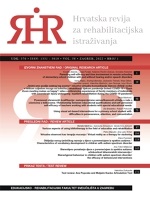Stereotipno ponašanje djece s poremećajem iz spektra autizma: učinkovitost bihevioralnih intervencija
Stereotypical behaviour in children with autism spectrum disorder: the efficacy of behavioural interventions
Author(s): Ana Tokić MilakovićSubject(s): Educational Psychology, Cognitive Psychology, Behaviorism, Inclusive Education / Inclusion
Published by: Sveučilište u Zagrebu, Edukacijsko-rehabilitacijski fakultet
Keywords: efficacy/effectiveness of behavioural interventions; treatment of stereotypical behaviour; stereotypies; autism spectrum disorder; evidence-based practice;
Summary/Abstract: Most individuals with autism spectrum disorder (ASD) typically exhibit stereotypical behaviours that often significantly interfere with their functioning. The aim of this paper is to provide a short overview of behavioural methods and procedures that are commonly used to reduce stereotypies in children with ASD, as well as to summarise the results of recent systematic reviews evaluating their efficacy/effectiveness. The findings of these systematic reviews suggest that, with respect to treating motor stereotypies, most empirical support is provided for altering the environment during the session and differential reinforcement of alternative behaviour (Akers et al., 2020). In the case of treatment of vocal stereotypies, empirical support for the use of auditory stimulation methods and methods based on consequences prevail (Wang et al., 2020). In this paper, the limitations of previous studies evaluating the effectiveness of behavioural interventions have been discussed and recommendations for future research projects proposed (conducting functional analysis prior to the implementation of interventions, testing the integrity of the treatment, examining long-term effects, studying the effects on other behaviours, generalisations across locations, stimuli, and people). Furthermore, in order to arrive at more accurate conclusions about the extent to which treatments are based on scientific evidence, the implementation of randomized controlled trials is recommended. In clinical practice, it is necessary to ensure that children with ASD are provided with therapeutic procedures grounded in science that can be administered in a timely manner with appropriate intensity.
Journal: Hrvatska revija za rehabilitacijska istraživanja
- Issue Year: 58/2022
- Issue No: 1
- Page Range: 145-171
- Page Count: 27
- Language: English, Croatian

